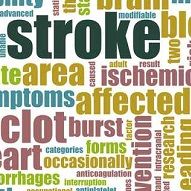Assessing Stroke Risk in People Who Are Not Overweight
A Korean analysis of 25,000 patients found a new risk of stroke: being metabolically obese even though body weight is normal.

Stroke prevention involves looking at risk. For instance, both metabolic syndrome and obesity increase the odds someone will have a stroke.
Department of Family Medicine, Hallym University Sacred Heart Hospital, Anyang, Gyeonggi-do, Korea.
Reporting in PLOS One, Young-Gyun Seo and colleagues found a new risk: being metabolically obese even though body weight is normal or under. The researchers work at the
Using the Korea National Health and Nutrition Examination Survey, the team selected about 25,000 subjects age 40 or older.
They defined metabolic syndrome using the 2001 National Cholesterol Education Program/Adult Treatment Panel III and 2005 American Heart Association criteria.
They defined non-obese weight as being below a BMI of 25 and obesity as being above that BMI.
They found that women with metabolically obese but non-obese weight had a higher prevalence of stroke than those with metabolically healthy obesity.
Metabolic syndrome, though not visible externally, “may be more dangerous than the more visible obesity phenotype,” the team noted.
“Therefore, our study findings may better emphasize the risk of stroke among more lean but unhealthy individuals, who appear healthy but may be suffering from metabolic syndrome.”
The findings also show there is a need for stroke risk factor assessment in people who are normal weight, or underweight.
Measuring weight circumference could be a place to start screening, they added.
Related Coverage: